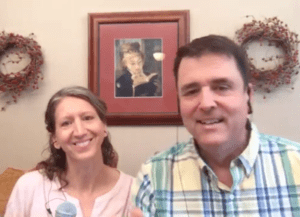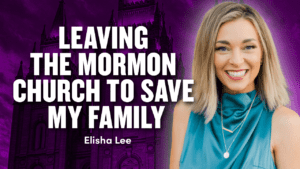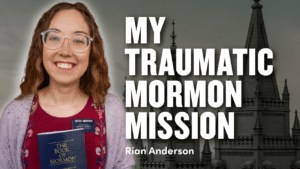
In this two-part episode, Dr. John Dehlin and his wife Margi hold a panel discussion with Kristin Marie, Michelle Ross, Paul Smith, and Ryan Stott. The panel navigates topics that include sexuality/purity messaging for the youth of the church, its impacts, and suggestions for approaching sexuality in healthy ways.
Part 1: The panel discusses the purity messaging they received as youth in the church and its impact on their sexual education and emotional well-being.
Part 2: The panel discusses healthy sexuality topics including developing your own definition of intimacy, negotiating your sexual experiences, and consent.
Part 1:
Part 2:
Part 1:
Part 2:




16 Responses
There is more wisdom about sexuality in a single South Park episode than has ever been spoken over the pews at the LDS church.
In the episode “Proper Condom Use”, they ask Chef what’s the right age to have sex.
Kids: “Chef, what is the right age for us to start having sex”
Chef: “It’s very simple, children. The right time to start having sex is: 17”
Kids: “17?”
Chef: “17”
Adults: “So you mean 17 as long as long as you’re in love?”
Chef: “No, just 17”
Adults: “But what if you’re not ready when you’re 17?”
Chef: “17, you’re ready”
Seriously, that’s better sex advice than anything you’ll read in a pamphlet published by the LDS.
Amen Brother Bob
There are some good thoughts here, but overall it’s not academic enough in that it doesn’t consider all the sides. It’s too biased. The result is that this will become a forum for those on one side.
A huge point of view on the other side that wasn’t really addressed is that sex leads to children and children ought to come into a stable environment found within the committed relationship of marriage. Even using protection could lead to a mistake.
Another point of view is that sleeping around could make one more curious about other partners when married, leading to more infidelity.
I can hardly believe that this discussion proceeded with no discussion of masturbation in LDS teachings about sexuality especially around single people! Why can’t we even say the word masturbation or the emense harm and monumental shame Church has taught about defining masturbation as a sin and harmful! Millions of LDS have felt moral conflict over masturbation and sexual experiences with others and church teachings.
As Marriage and Family Therapy Therapist, I am suprized that it is so hard to discuss this among the LDS community.
On other items wow, the level of discussion here is so basic. Look today we need to be knowledgeable and comfortable with discussing inthe LDS community and with partners fundamental issues like hard and soft limits, interests, what you want in sexual experiences, safe words, fluid bonding, STD’s, sexual history, sexual experiences, sexual trauma, consent, relational desires/goals, power exchange, shared values, and turnoffs.
Timothy – We’ve covered masturbation a TON in previous episodes. You must be new to these parts.
Amen, Timothy, about the masturbation.
Mormon teens easily internalize the sex and sin garbage of Alma 39:5, Moroni 9:9, McConkie’s ‘Mormon Doctrine,’ Spencer Kimball’s “Miracle of Forgiveness,” and all of those outrageous and grotesque crap quotes from 20th century apostles & prophets about –– “better dead than lose your chastity and virtue…come home dead clean rather than alive but unclean” etc.
With a LOT of resulting shame, guilt, “unworthiness” and depression from early teen and beyond. At least for boys and men.
Since girls don’t masturbate, I’m not surprised that neither Kristin nor Michelle mentioned it. I would have predicted that either Paul or Ryan or both would have.
(Just now noticing John Dehlin’s reply. I’m not brand new –– have listened to maybe 69 or so episodes –– but haven’t yet heard more than passing mention of masturbation on Mormon Stories.)
Emerald – https://www.mormonstories.org/245-pornography-masturbation-sex-and-marriage-in-mormonism/
That whole part about testing out whether or not you are sexually compatible seems wrong to me. When I first got married, we were not sexually compatible. I mean, the parts fit where they should, but it wasn’t really enjoyable for either of us. It took 6 months before we even had one really good sexual experience. After that, it was probably a couple of years before it was good every time. And now, after 14 years of marriage, it is very good for both of us every time. It would be a tragedy if we had broken up after a year because we were not sexually compatible. I think that’s actually a good reason to not have sex until you are married. I imagine if we had dated for a month and started having sex, like most people do, after several months we could easily have decided that we weren’t right for each other, and then not ended up together and missed out on the awesome relationship and great sex that we have now.
I know this podcast was addressed to single adults, so the situation might be different, but for those of us who got married young, I think not having multiple sexual partners is great. I don’t compare my wife to other women in bed, and I don’t wish that she were someone else. At one point John talked about how he might have acted differently with girls if he hadn’t been following church rules, but I don’t see who would benefit from that. I mean, would Margi be happier knowing that he had slept with other girls before her? Would he be happier having someone to compare his wife to?
I appreciated the advice to take things slowly when you leave the church. That’s the smartest thing to do.
I think you bring up some really good points Carl.
I appreciated this discussion. I could relate to so much of it. I, too, left the church as a single woman at 31, mostly because I lost belief in a deity that would require a lifetime of suppression and disconnection from self and others. We are wired for intimacy, emotional and physical. Understanding this was key for me to finally be able to walk away. It hurt and sometimes it still hurts but I still feel relief that I no longer have to justify my existence as a single woman.
Since the discussion was focused on sexuality, no one really talked about how a lack of emotional intimacy with a partner also takes a toll on well-being. That would be an interesting topic for another time. I know for me, I still struggle with fears of being unable to connect with men emotionally, partly because I went without dating prospects for so long. There are lots of interesting ramifications of being an “older” single in Mormondom (older = late 20s and beyond). I’m glad a dialogue is being opened so that we can have more awareness of what some of those ramifications are and what they mean for the church culturally and intitutionally.
Believer of Josh, thanks friend for chiming in with your support even if as it appears that my comments were censored/deleted.
John,
I stumbled across a response you wrote to a woman’s comment critiquing a previous podcast…
“Thanks for sharing your feelings, Cynthia. Mormon Stories is about open dialogue, and multiple perspectives….so I hope you will help us achieve that goal. Sorry we caused you pain. Help us make it better if you can.”
John Dehlin
Perhaps, that’s how it works when one is a victim to so heroically hear out and rescue? Especially a female or non-het male? The more I follow Mormon Stories the less convinced I become of your self proclaimed fidelity to truly open dialogue from multiple perspectives.
I really enjoyed listening/viewing both videos on Sexuality. I grew up in an IFB (Independent Fundamental Baptist) church and am in the process of transitioning out of religion and still experience many of the things the moderators spoke about. Thank you for addressing these issues!
Fifty-eight percent of Mormon women admit to having sexual intercourse before marriage.
https://archive.sltrib.com/story.php?ref=/ci_14492575
Trib article August 9, 1991
Frank
I really appreciate the attempt to shed more light on these issues for single people, and am grateful to the panelists who were willing to share this really personal part of their lives.
At times, I felt like the interviews would have been more helpful to me if the panelists had been willing to disclose a little bit more.
For example, Paul talked about “acting out.” I think the comments may have been more meaningful to me if he could have shared more specifics about his story.
Ryan said a couple of times, “wherever you land, land softly.” I think what he meant by this was “don’t go to extremes” or “don’t go crazy with your newfound freedom.” This is helpful, such as it is, but I think could have been even more helpful if I’d had a specific story to connect it with. Once you decide you’re open to being sexually active, you’re opening up to taking some risks. I suppose everybody must decide for themselves what level of risk is comfortable for them… and what level of risk goes with what level of commitment… But how do you have those conversations with another person about intimacy and commitment… about what it means to you, about what your expectations are? This is a really important kind of communication and our religious upbringing doesn’t really prepare us for it.
When I first started dating outside of Mormonism, I missed the pre-set expectations. When you date within a shared culture, and the limits are set from the pulpit, it makes dating easy / more comfortable in the sense that everybody knows what to expect. It also creates a situation where you don’t have to talk or negotiate very much about what you’re comfortable with physically. Now, my opinion is changing. Although the religious set-up may be more comfortable in the beginning, I wonder if it takes away an opportunity to learn some important communication skills. Maybe negotiating about about kissing and touching can help young couples learn to negotiate when it comes to sex itself.
Also, it seems that most people on this panel are willing to accept sex outside of marriage or sex outside of a formal commitment… I’m curious if John or others could speak to whether it is possible to maintain a relatively traditional view of sex and marriage while still cultivating generally good mental health. Is it possible to believe that sex should be reserved for married / engaged couples while letting go of some of the harmful attitudes of shame around sex that come from religious teachings? The fact that there is no one on the panel with this view seems to suggest that it is not possible.
I’ll tell y ou about a sexual mistake you can make when you’re 45; being a post-mormon and dating an active, divorced LDS woman of 41. This ended up being the single most pasisonate sexual relationship of my life, but also the most messed up. She would give freely, take away when she would feel guilty, then she’d open upen up again, then guilt again, over and over.The sad thing is, when we were together, it was absolutely the most open, healing, rich, full, spiritual intimate eccounter of my life. We were natural lovers which I beleive is a very rare thing in this world. It angers me to no end that the Church was invoved with our intamacy and in some strange ways tied back into my sex guilt, which I had let go of a few years earlier. I had a constant anxiousness in the relationship that a bishop’s temple recommend interview request, or even the blessing she got when she was diagnosed with breast cancer, that she would be healed according to her faith, I know these things played into all of this dysfuction. I just out of the relationship and more angry about what the Church does to people then ever. I have suffered extreme losses due to this organization. I had a family, was building a family with this woman, I loved her kids as my own and they loved me. It’s devestating and it’s not the first devestation I’ve sustained due to the Church. Lesson: never get involved with a person who’s life is not their own, who is not their own highest authority, or at least be ok with the authority they’ve commited to. I am a good man with a pure heart and I will not have that organization say what we had together was evil or sin. Ironically, I even asked her in the end if whe would ever regret what we had. She said she wouldn’t and added that neither of us will probably ever find that with another person again. I’ve lived long enough to know that’s probably true. Sad, sad, sad…